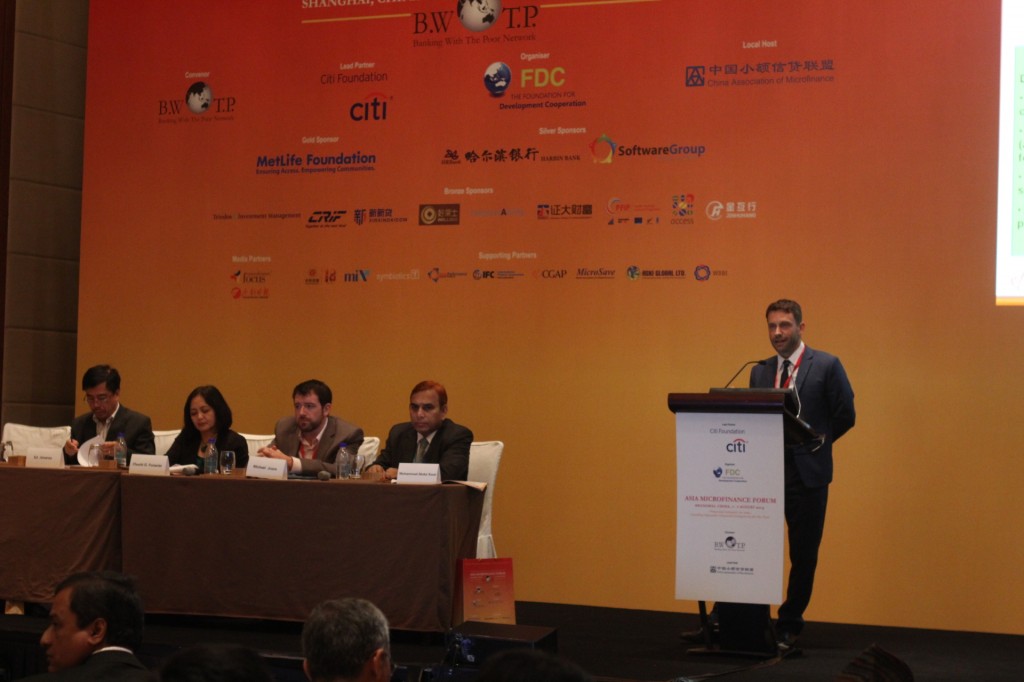Financial Inclusion Policy and Regulation
13:30 to 17:00 CST: Microfinance and financial inclusion have proven to be effective strategies for economic growth and poverty reduction. Panelists in this session of the 2014 Asia Microfinance Forum discussed the role of policy makers in furthering these goals.
The microfinance industry is growing exponentially, in terms of service providers and products/services offered. A major issue arising from this was posed at the beginning of the session: how can regulation and supervision keep up with the increased demand, expanding technology and growing complexity of the financial service markets in microfinance?
Both Eric Duflos of CGAP and Michael Joyce of TNP2K highlighted the advances of technology as the largest agent of change affecting regulation and policy in inclusive finance.
Regulators need to understand that risks are continuing to change with technology. Mr. Duflos remarked that “technology has changed regulatory issues, including introducing risks accruing from information disclosure on mobile devices, relationships with agents, bundling services such as mobile wallets and ‘instant consumer loans’, to cite only a few of the conundrums facing policy-makers today.”
He continued, “However, because technology also expands the reach of financial service providers to clients, reduces transaction costs, and makes innovative products available to clients in remote and rural areas, these risks are outweighed by the benefits, and need to be mitigated.”
Mr. Duflos also noted that, while addressing new issues raised by technology, regulators and policy makers should also continue to address the three core objectives of financial consumer protection: transparency, fair treatment and effective recourse for the customer when things go wrong.
He asked the participants who had had a fraud in the last year either on their credit card or at an ATM. About 10% of the people had lost some money but all of them had recovered their money. Mr.Duflos explained that poor people also face issues of fraud when it comes digital finance and it is essential to better understand the nature of the risks and also how to better protect them as well as give them recourse mechanisms that enable them to get their money back.
Mr. Duflos raised the question, “Who is going to regulate digital finance?” The Central Banks usually monitor a contract between provider and client, and hold the provider responsible for most problems.
With industry growth, maintaining close client relationships becomes more necessary, but also more difficult. Mr. Duflos suggested that communication from the “ground-level” – what is really happening as clients use products that depend on technology will guide the industry in policy and regulation. For instance, experience with clients indicates that the industry needs ways to deal with problems like shared PIN numbers, lost SIM cards and the fact that low-income clients are more vulnerable to fraud.
Mr. Michael Joyce elaborated topics raised by Mr. Duflos. “Digital financial services are one way to overcome obstacles to inclusion”, Joyce remarked, “especially obstacles of distance, cost and accessibility.” There are specific risk and trust factors raised by digital financial services: risk has become more spread out, making things harder to control. “What could once only happen in a bank branch can now happen in a small village.”
Two additional thoughts expressed in this session have also become major themes at this year’s Asia Microfinance Forum:
First, that reducing the use of cash through technology will benefit clients by easing transparency, accessibility, and availability of products/services to clients. And second, now there is an ever-present underlying knowledge informing most banking and regulatory decisions: that microfinance clients, even the poorest ones, all have cell phones.
The The Foundation For Development Cooperation (FDC), the organizer of AMF 2014, facilitated this session. The FDC’s mission is to harness and leverage knowledge and resources from across the public, private, NGO and academic sectors in order to alleviate poverty in Asia. FDC is based in Australia.





